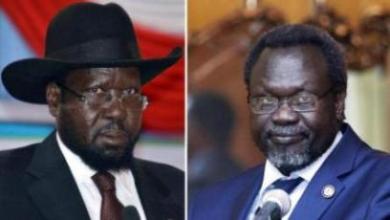S. Sudan rebel leader criticises Kiir’s speech to parliament
April 22, 2015 (PAGAK) – South Sudan’s former vice-president turned armed opposition leader, Riek Machar, has criticised president Salva Kiir’s speech which he delivered to the national legislature on Monday, accusing him of misleading the people of the war-torn country.

“Today (Monday) I stand before you in this August House once again, to update you on the peace process … the steps taken so far by your government following the unsuccessful coup and the rebellion,” he told parliamentarians.
“As such, the violence phenomenon by the greedy politicians for power must always be condemn[ed] and fought collectively,” Kiir said in direct reference to Machar and his colleagues.
He also accused his former deputy and political rival of demanding two armies in the country and imposing federalism without the people’s consent as well as trying to install himself as prime minister and then changed his demand asking to become first vice-president.
Kiir added that it was the opposition faction led by Machar that was violating the cessation of hostilities agreement since January last year, assuring the national legislature of his government’s commitment to the peace process.
He said he was serious to make peace with the rebel group which he accused of “failure” of the last round of the IGAD-mediated negotiations.
SPEECH MISLEADING
Machar described the president’s speech as “misleading,” adding the world already dismissed the coup narrative as false.
His spokesman, James Gatdet Dak, said the message was to try to mislead the people.
“This is continuation of misleading South Sudanese people that there was unsuccessful coup,” Dak told Sudan Tribune from the rebel held town of Pagak on Wednesday.
“Salva Kiir wants to justify the massacre of thousands of innocent people in Juba in December 2013,” he added..
Dak said the rebel leadership was not surprised by Kiir’s desire to continue to mislead the lawmakers and South Sudanese people about the dismissed coup attempt and crime justification, saying the world should bring president Kiir to account for the genocide.
Dak said the whole world knew there was no coup, including Kiir’s senior security officials who told the African Union’s commission of inquiry that the coup narrative was false.
Machar also dismissed as “incorrect” the claims by Kiir that the rebel leader had asked to become either a prime minister or first vice-president in the proposed transitional government.
“The proposed positions of prime minister or first vice-president never been our initiated position. It was generated either by IGAD or Salva Kiir himself,” Dak, who accompanied Machar to Pagak, further said in reaction to the speech.
Dak said the opposition group did not also demand two armies in the country as “misrepresented” in the president’s speech to the parliament, saying what they demanded was amalgamation of the two forces during the 30-month proposed interim period after which there should be one national army.
He also said federalism has been a popular demand of the people of South Sudan since 1947 and should therefore be implemented in the transitional period and enshrined in the constitution.
The media official for the rebel leader further explained that the government had never respected the cessation of hostilities agreement and continued to keep foreign forces to interfere in the internal conflict including the Ugandan People’s Defence Forces (UPDF) and Sudanese rebel groups.
He said Kiir’s government had no peace program as claimed and also dismissed the government’s general amnesty issued to former detainees to return home as a “trap to re-arrest them”.
Dak also said the leadership of the rebel faction declared the current national legislature in Juba as illegitimate, saying the lawmaking institution had lost its legitimacy since 8 March this year when its tenure ended.
He asserted that the parliament cannot therefore extend its own lifespan or that of the presidency or the state assemblies.
He further criticised the national legislature for also attempting to tackle the fate of the state governors, adding this was another “violation of the constitution” because the states, he said, are a separate level of government that should not be tempered with by Juba.
(ST)
